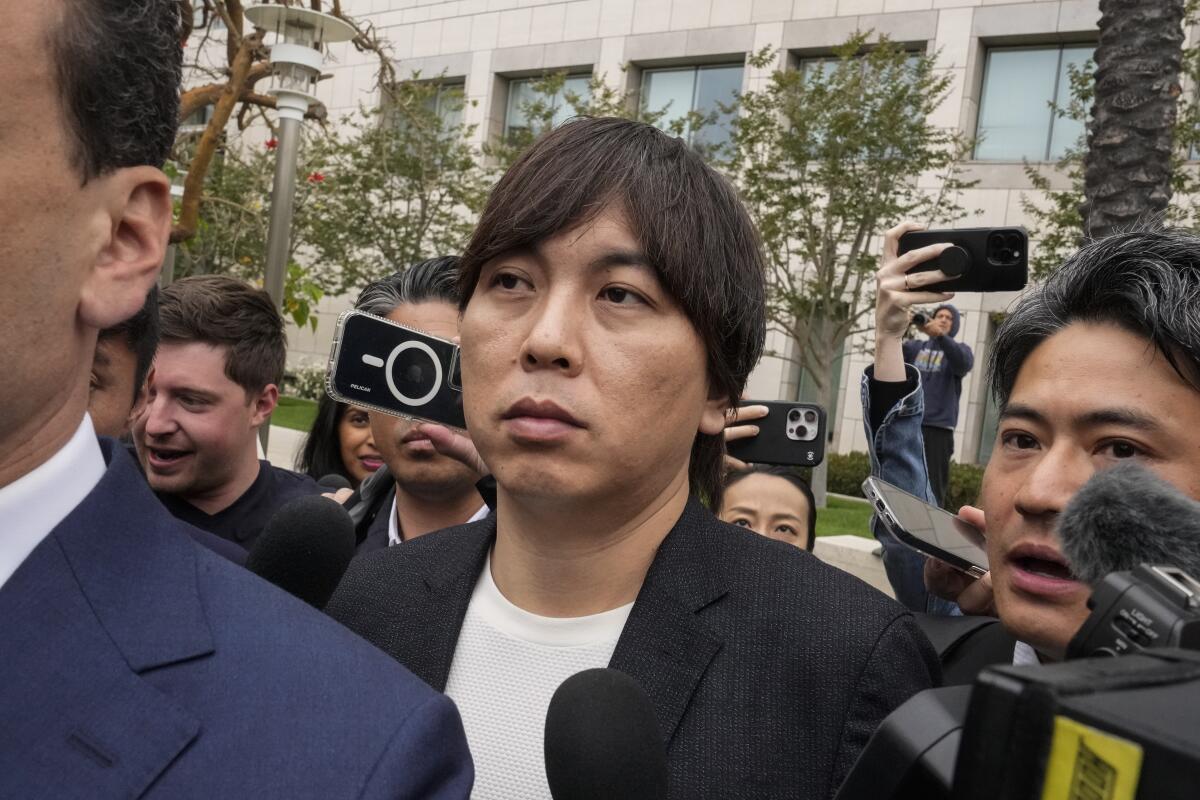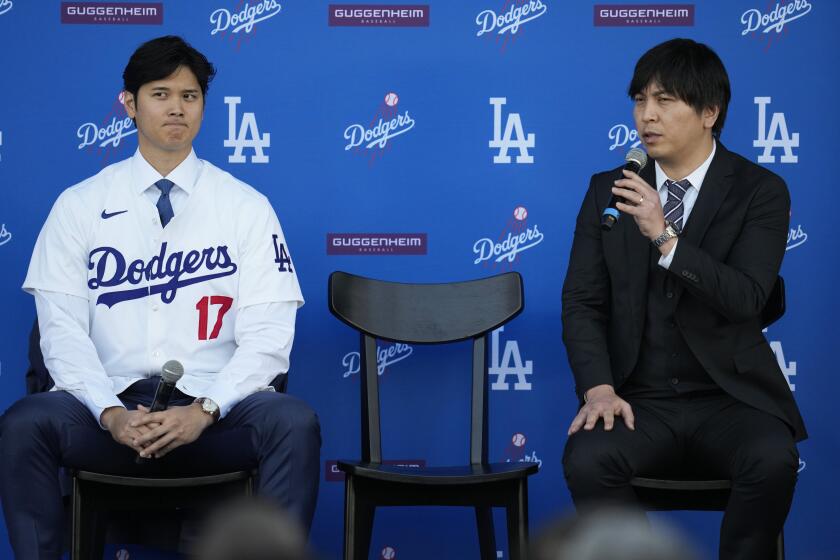Interpreter who stole millions from Shohei Ohtani faces prison at sentencing

- Share via
Ippei Mizuhara, the former interpreter for Dodgers superstar Shohei Ohtani, is scheduled to appear in federal court Thursday afternoon in Orange County to be sentenced for stealing nearly $17 million from the Japanese baseball player to cover debts.
Mizuhara previously pleaded guilty in June to bank and tax fraud. Prosecutors have asked for a nearly five-year sentence; Mizuhara requested a year and a half.
The sentencing will bring to a close a scandal that rocked the sports world last March, when the Dodgers fired Mizuhara amid an investigation into claims he had secretly gambled away Ohtani’s money. Mizuhara admitted to spending the money on bets with an illegal bookmaker, accruing large debts while also buying $325,000 worth of baseball cards and undergoing costly dental work.
Prosecutors want Mizuhara to pay close to $17 million in restitution to Ohtani and a little more than $1 million to the IRS.
Now that Ippei Mizuhara is under a microscope following allegations he stole millions of dollars from Dodgers star Shohei Ohtani to cover gambling debts, key aspects of his biography have proved difficult to confirm or turned out to be false.
As part of his job as translator and de facto manager of Ohtani, Mizuhara served as a go-between between the player and his non-Japanese-speaking agents and financial advisors, according to Mizuhara’s plea agreement. Prosecutors in their sentencing memo said Mizuhara’s conduct harmed Ohtani’s reputation and goodwill.
Prosecutors wrote that even though there was “overwhelming evidence that showed that Mr. Ohtani had no knowledge” of Mizuhara’s activities, “several public figures continued to question how Mr. Ohtani did not notice that this one particular account was being mismanaged.”
“Let there be no doubt, Mr. Ohtani is truly a victim and has suffered, and will continue to suffer, harm,” the sentencing memo said.
In a letter to the judge ahead of sentencing, Mizuhara said he’d put his “heart and soul” into his work, taking on the role of driver, trainer, chef, off the field interpreter and support member for Ohtani over the years. But he also seemed to drag his former boss, writing that Ohtani paid him roughly $11,000 per year, which left him living “paycheck to paycheck.”
Mizuhara was an employee of the Los Angeles Angels MLB team, for whom Ohtani played from 2018-23, and, later, the Dodgers, for whom Ohtani has played since 2024. Ohtani paid him separately for the additional work, according to the Department of Justice.
Mizuhara claimed to have had numerous offers to write books, do TV and radio interviews and appear in commercials, but said those were “shut down from Shohei and his company in Japan.”
Desperate for money, Mizuhara wrote, he began sports betting in an attempt to help himself financially.
“And before I knew it, the results were the complete opposite,” his letter stated. “My gambling debt had grown so much that I could not find any way to pay it but to use Shohei’s money.”
Mizuhara’s lawyer, Michael G. Freedman, said in his sentencing memo that his client’s “longstanding gambling addiction… was uniquely exacerbated by his grueling work and exposure to high-stakes bookmakers in the world of professional athletes.”
Federal authorities said evidence supports Dodger Shohei Ohtani’s claims he was unaware of alleged illegal gambling by his interpreter and a victim of bank fraud. He can play ball.
Because Mizuhara is not a U.S. citizen, “it is virtually certain he will be deported to Japan following his incarceration,” Freedman wrote.
Mizuhara admitted he obtained the login details for Ohtani’s bank account in 2018, when he translated for the baseball phenom as he set up an account at a bank branch in Phoenix. Mizuhara started making illegal bets with an Orange County bookie in September 2021, before later falling deeply into debt, according to the agreement.
According to the plea agreement, Mizuhara used Ohtani’s password to sign into the bank account and then changed the registered email address and telephone number so bank employees would call Mizuhara, not Ohtani, to verify wire transfers from the account.
Mizuhara called the bank and impersonated Ohtani about two dozen times, according to the plea agreement. The interpreter made a number of sizable wire transfers, prosecutors said, including one for $500,000 to an associate of the bookmaker. Prosecutors said that Mizuhara used Ohtani’s money to purchase baseball cards between January and March 2024, hoping to later sell them for profit.
In a response to Mizuhara’s sentencing memo, prosecutors told the judge there was no evidence of gambling addiction, “other than [Mizuhara’s] self-serving and uncorroborated statements to the psychologist he hired for purposes of sentencing.”
Ippei Mizuhara pleaded guilty to bank and tax fraud Tuesday, admitting to stealing from Dodgers star Shohei Ohtani to place illegal sports bets.
Prosecutors said the government looked at more than 30 casinos around the U.S. and only found evidence of Mizuhara spending $200 at the Mirage casino during a weekend in 2008. They found that Mizuhara had registered for FanDual in 2018 but never placed a bet.
He only began betting online with DraftKings in 2023, prosecutors said, after already having stolen millions of dollars from Mr. Ohtani.
They also pushed back on his claims of living “paycheck to paycheck,” pointing out the $250,000 salary Mizuhara earned in 2023 while stealing millions of dollars and also the $85,000 he made in 2022. Prosecutors said Mizuhara had no loans, car payments or rent expenses. He’d used Ohtani’s debit card to pay his rent and Ohtani gave him a Porsche to drive, they said.
Mizuhara’s checking account in March 2023 had a balance of $30,236 and $195,113 in March 2024, according to prosecutors.
“Here, there is no doubt defendant feels ashamed from the international attention he received from his fraud scheme and web of lies, but instead of showing true remorse defendant appears to try to justify stealing millions of dollars from Mr. Ohtani,” prosecutors wrote. “Instead of using this opportunity to apologize and show true remorse, he has used it, in a public filing, to complain about his work and Mr. Ohtani.”
More to Read
Sign up for Essential California
The most important California stories and recommendations in your inbox every morning.
You may occasionally receive promotional content from the Los Angeles Times.














